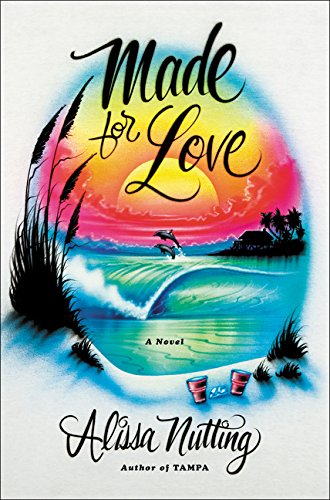
Not long after the nine-page sex scene between a dolphin and a man who resembles Jesus, it clicks: Alissa Nutting’s Made for Love is all about power. Obviously, there’s nature’s power over man, as in the case of the porpoise initiating coitus, but the dynamic works the other way, too. Behold Byron, Gogol Industries’s wunderkind founder, wholly focused on prolonging our lifespans, making physical existence frictionless, and obliterating the line between human and artificial intelligence. Byron wields power over the world. See also Herbert, the 76-year-old widower who recently purchased a lifelike sex doll for companionship. Herbert wields power over loneliness, and the natural arc of his love life. Stuck between both is Hazel, Herbert’s daughter, who’s just run out on her loveless marriage with Byron, seeking refuge in the trailer park where her father lives. Presently, Hazel is powerless.
It becomes clear over the course of Nutting’s second novel that technology can and does warp the established order of these power relationships. With Gogol’s boundless capabilities, everything is permitted. Diseases can be cured, brains can be hacked, and the pain of spousal loss can be mitigated. This has brought Byron enormous personal wealth, and with limitless resources, estranged wives can be tracked down no matter how far they run.
But let’s get back to the dolphin.
On a beach one day, we find Jasper, a conman who finesses women out of their money by faking relationships with them. He’s out for a swim when, suddenly, a dolphin attacks. Quickly, it’s apparent that this dolphin is interested in Jasper’s body, but not for consumption. The two wrestle, and ultimately Jasper escapes with only small abrasions and a minor bite mark, yet forever after he’s sexually attracted to dolphins. (Don’t you hate it when that happens?) Immediately, this poses a problem for the conman. No longer is Jasper able to seduce human women; instead, he fantasizes about the whistles, groans, and creaking door squeaks of bottlenose beauties. Jasper’s solution to this problem is logical: he abandons his trade, and in order to spend more time with his paramours, he trains as a dolphin handler at a SeaWorld-like amusement park, saving up money for an expensive neurological procedure offered by Gogol Industries. Using brain implantation and experimental technologies, Gogol scientists promise to fix Jasper’s ailment. He’ll remain attracted to the aquatic mammals, of course, but now when he’s intimate with a human woman, his mind will trick him into believing she’s actually a dolphin. Problem solved!
Isn’t it just like modern technology to treat the symptoms instead of the cause? To reorient the world in such a way that it accommodates quirks and defects – however harmful or unhealthy – instead of encouraging people to solve their own problems, or organize to solve society’s?
Although Made for Love takes place in the not-too-distant future, it’s easy to find parallels right now. Attracted to animals? Jasper’s found an experimental neurological procedure for that. Too lazy to walk outside to get lunch? There’s an app for that. Too busy working to do something as fundamentally human as eat a meal? There’s a porridge-like gruel for that. Cut off from the places you need to go because of dilapidated, unreliable, or altogether nonexistent public transportation? There’s a fleet of underpaid indentured servants here to help. Too constipated from being over-prescribed opioids? There’s another medication for that. We’ve never been more “connected,” but we’ve also never been more miserable. We’ve never been more prosperous, but we’ve rarely been so unequal. The powerful have never been more so, but instead of real solutions to all problems they’ve developed profitable band-aids for some. The “move fast and break things” ethos presupposes that things aren’t structurally broken already. Why fix anything when you can profit off dysfunction? While great power brings great responsibility, nothing seriously compels the powerful to act responsibly.

 Nutting is the perfect writer to examine this absurdity, and what she’s done in Made for Love is remarkable. Let’s just put it out there: go read this book. In twenty-three chapters, which advance in a page-turner style reminiscent of another Florida powerhouse named Carl Hiaasen, Nutting covers a lot of ground: technology’s promises, limitations, and the enduring – though often forgotten – allure of natural life and love. And although her writing shares superficial similarities with Hiaasen’s, Nutting is consistently funnier, and she has a more careful eye for literary flourishes. For every punchline, Nutting also renders her characters’ most intricate neuroses in vivid, memorable detail. While some characters speak in dialogue that could work for both authors – “If you want, we can wrap ourselves up in mosquito netting while we have sex” – Nutting sets herself apart by getting way darker than Hiaasen ever would. There’s a scene in which Hazel’s mother effectively cancels Christmas one year because she believes they’ve watched the spirit of a deceased friend dissipate out of a meatloaf.
Nutting is the perfect writer to examine this absurdity, and what she’s done in Made for Love is remarkable. Let’s just put it out there: go read this book. In twenty-three chapters, which advance in a page-turner style reminiscent of another Florida powerhouse named Carl Hiaasen, Nutting covers a lot of ground: technology’s promises, limitations, and the enduring – though often forgotten – allure of natural life and love. And although her writing shares superficial similarities with Hiaasen’s, Nutting is consistently funnier, and she has a more careful eye for literary flourishes. For every punchline, Nutting also renders her characters’ most intricate neuroses in vivid, memorable detail. While some characters speak in dialogue that could work for both authors – “If you want, we can wrap ourselves up in mosquito netting while we have sex” – Nutting sets herself apart by getting way darker than Hiaasen ever would. There’s a scene in which Hazel’s mother effectively cancels Christmas one year because she believes they’ve watched the spirit of a deceased friend dissipate out of a meatloaf.
At her best, Nutting’s humor would fit in one of America’s great comedic masterpieces, King of the Hill: the way Herbert’s eyes tear up joyously when he says “I drink for the both of us” after his daughter jokingly asks if the sex doll imbibes; how the manager of a fleabag restaurant tells a down-on-her-luck Hazel:
I can pay you cash but I’ll pay you a lot less. It’s nothing personal. I’m running a business. If you’re that desperate it would be irresponsible of me, from an economic standpoint, not to take advantage.
 It’s impressive that a man attracted to dolphins isn’t even the book’s main character, nor is he a distraction. This is Nutting’s second novel in which she’s brought readers uncomfortably close to topics they rarely examine seriously, and after Tampa and now Made for Love, she’s officially made a career out of writing books impossible to explain to coworkers and parents. It’s a credit to Nutting’s dexterity that she can examine something as large and unwieldy as technology’s influence over our lives while also plotting a relatable story about falling out of love in one place, and looking for it in another.
It’s impressive that a man attracted to dolphins isn’t even the book’s main character, nor is he a distraction. This is Nutting’s second novel in which she’s brought readers uncomfortably close to topics they rarely examine seriously, and after Tampa and now Made for Love, she’s officially made a career out of writing books impossible to explain to coworkers and parents. It’s a credit to Nutting’s dexterity that she can examine something as large and unwieldy as technology’s influence over our lives while also plotting a relatable story about falling out of love in one place, and looking for it in another.
Because who hasn’t fantasized about ditching their devices and returning to a more natural existence? After Hazel runs out on Byron, she ponders the same weary thought we all think after too much time in front of our screens.
Little things like physical keys made Hazel feel as if she were going back in time, which she realized was exactly what she wanted to do. Get away from the futureworld she’d lived in with Byron, away even from the technological present. From now on she wanted no part of what Byron and his cohorts liked to call the Bionic Revolution, though they frequently slipped–was it a slip?–and said Byronic.
The more she could live a strictly manual and basic life, the more distant she’d be from him, and that was a hopeful thought: there was a way to feel like she was reclaiming herself.
 Essentially, this is a thought shared by some subjects in Emily Witt’s Future Sex, an investigation of the Silicon Valley, modern romance, and the ways the two awkwardly interact. It makes for an incredibly interesting companion to Made for Love, and it’s even got an essay on sex dolls, but the most telling parallel comes later on, when Witt joins a group of young Google and Facebook employees who attend Burning Man each year in search of an “autonomous zone” in which they’re safe to exercise their hedonistic and sexual fantasies, unbridled from traditional societal constraints. Reflecting on how these festival attendees will probably not bring the values they exhibit at Burning Man back to the “real world,” Witt writes:
Essentially, this is a thought shared by some subjects in Emily Witt’s Future Sex, an investigation of the Silicon Valley, modern romance, and the ways the two awkwardly interact. It makes for an incredibly interesting companion to Made for Love, and it’s even got an essay on sex dolls, but the most telling parallel comes later on, when Witt joins a group of young Google and Facebook employees who attend Burning Man each year in search of an “autonomous zone” in which they’re safe to exercise their hedonistic and sexual fantasies, unbridled from traditional societal constraints. Reflecting on how these festival attendees will probably not bring the values they exhibit at Burning Man back to the “real world,” Witt writes:
If I had to predict a future, it would be that Burning Man would last only as long as we did, the last generation that lived some part of life without the Internet, who were trying to adjust our reality to our technology. Younger people, I hoped, would not need autonomous zones. Their lives would be free of timidity. They would do their new drugs and have their new sex. They wouldn’t think of themselves as women or men. They would meld their bodies seamlessly with their machines, without our embarrassment, without our notions of authenticity.
This is the future Byron and Jasper want, optimistically rendered. Yet it’s also the future Hazel fears, for she’s witnessed its limitations and drawbacks. For men like Byron and Jasper, technology brings convenience, and bends reality to meet their needs. (Even Hazel’s father, Herbert, benefits from this dynamic when he satisfies himself with advancements in sex doll technology.) All the while, Hazel’s left out. For her, technology is an imposition, a threat. When it feels like everybody on earth is using technology to pursue their deepest desires, who’s allowed to opt out?








